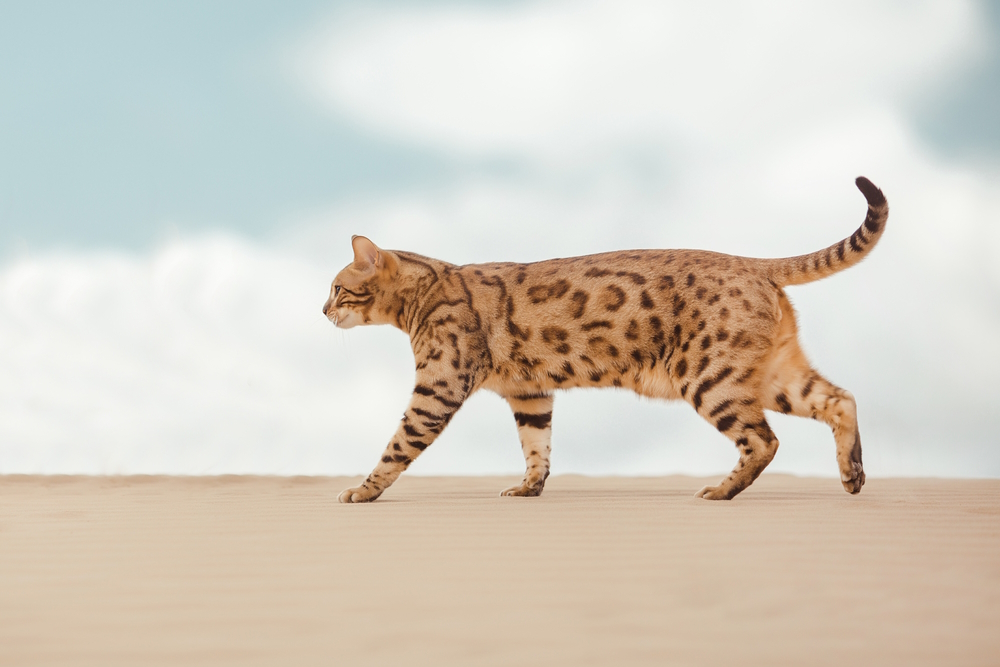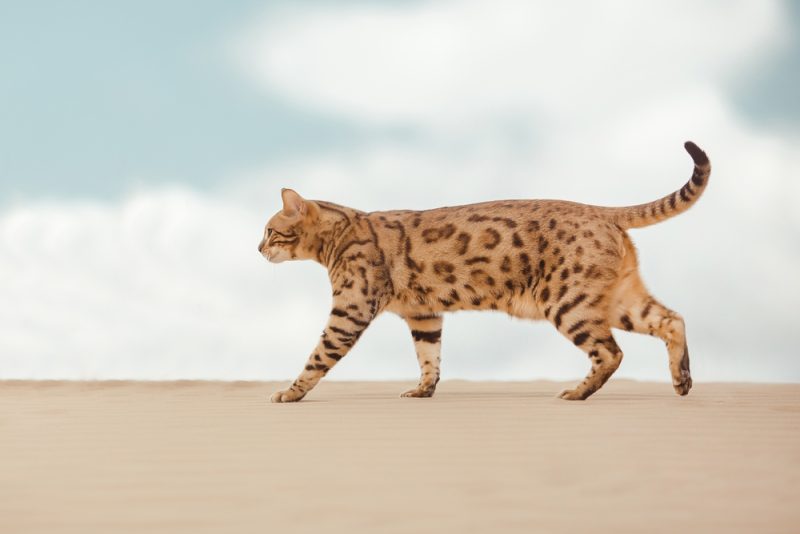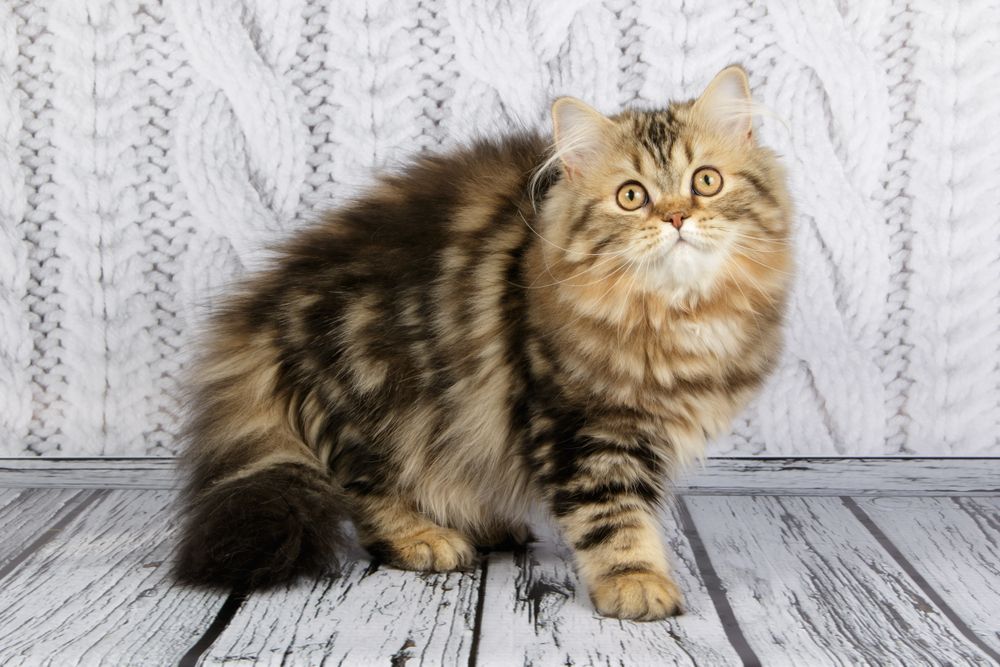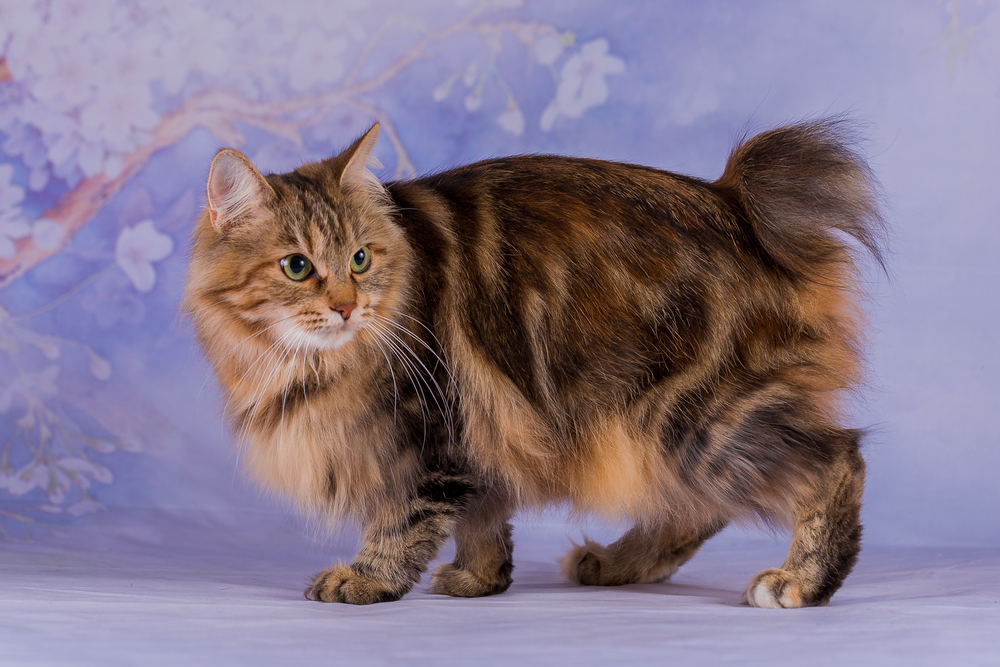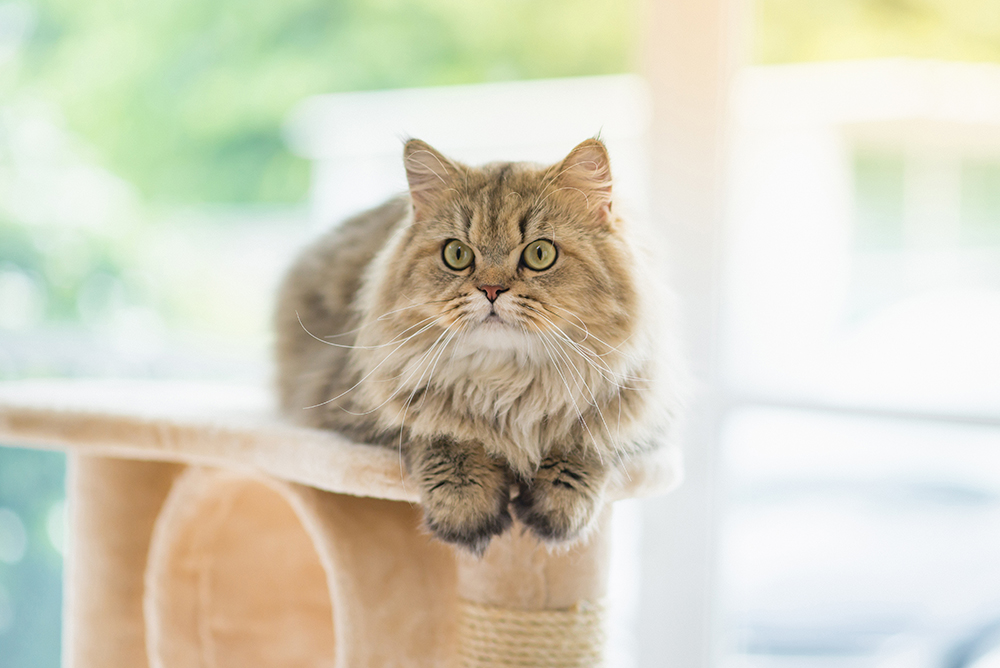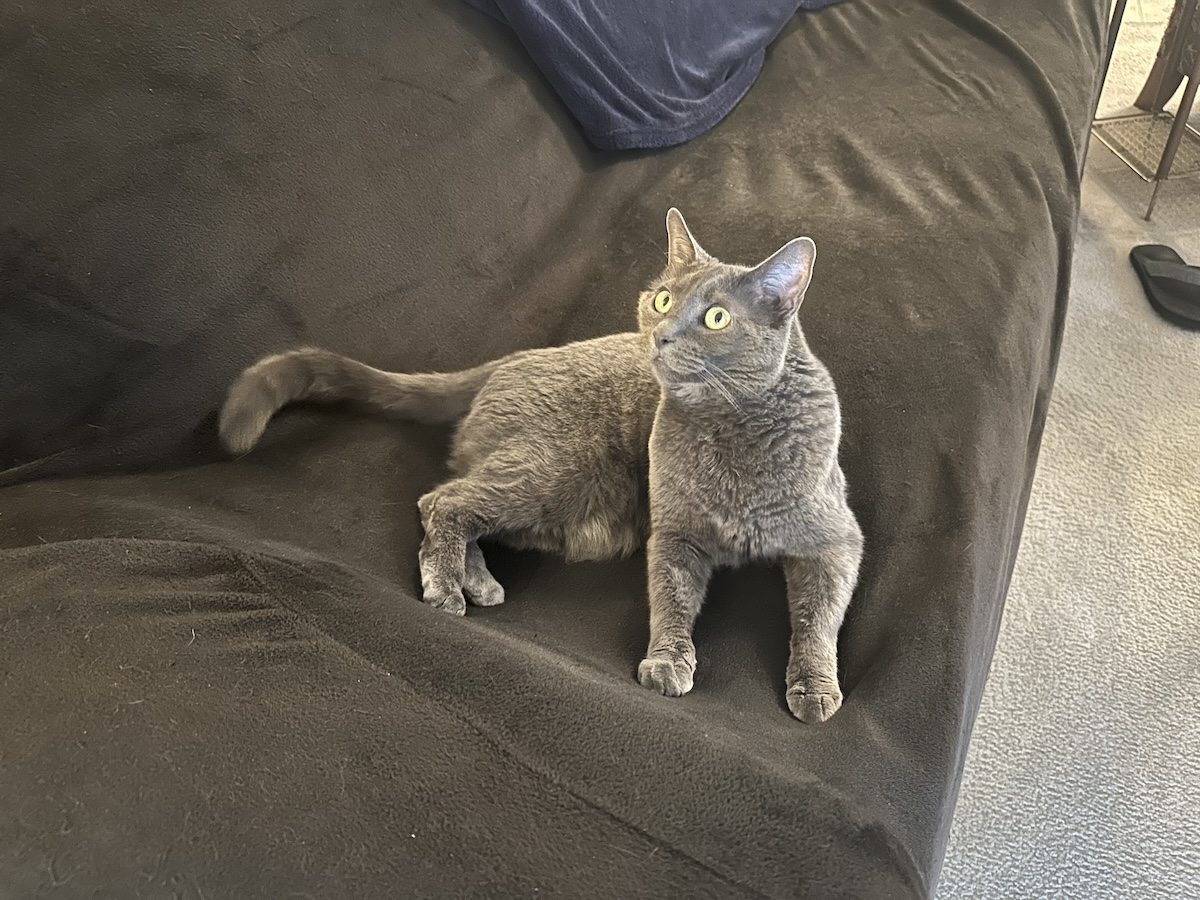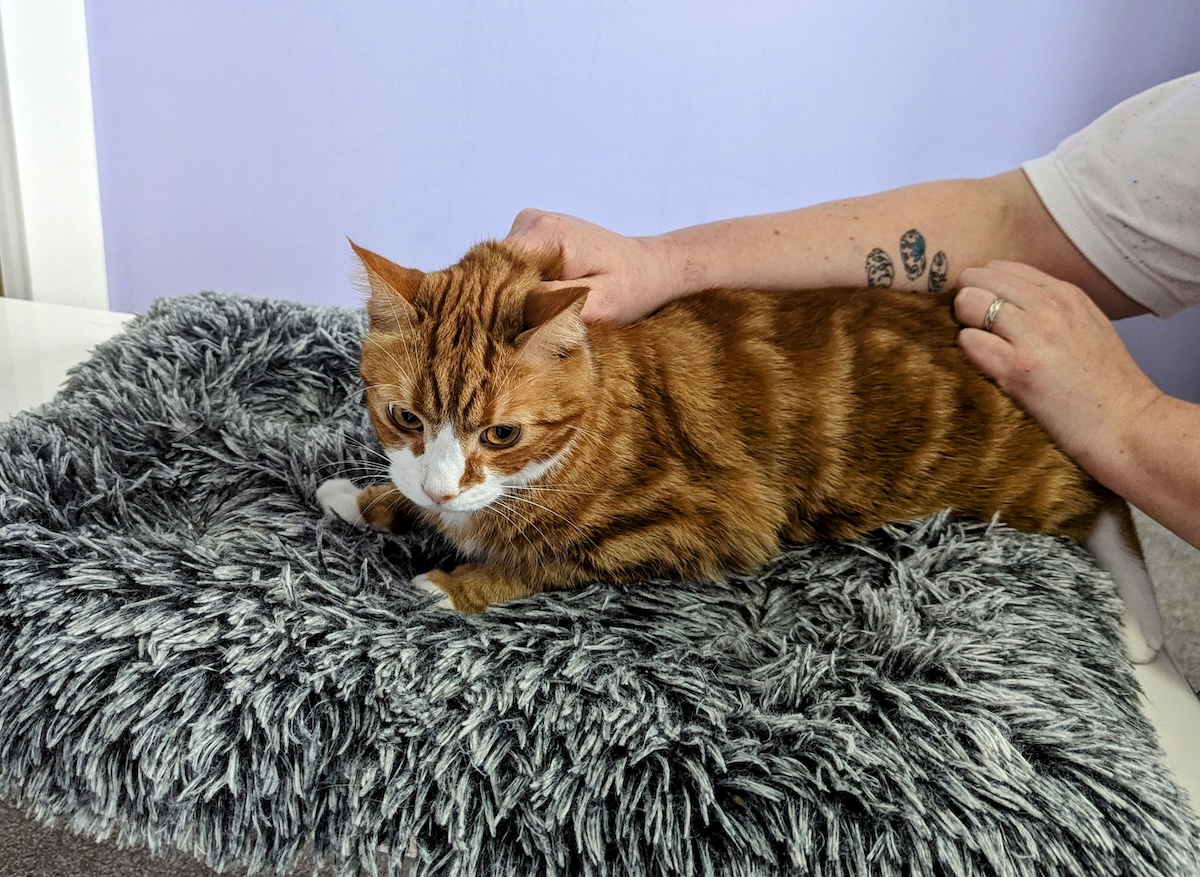Click Below to Skip Ahead
If you want a pet that’s as small and friendly as a regular housecat yet retains many of the characteristics of much larger jungle cats, then the Savannah cat may be the pet for you.
These cats resulted from the purposeful crossbreeding of domestic cats and servals, which are medium-sized African wild cats. The result was the largest domestic cat breed in the world (on average, anyway—a few Maine Coons have ended up being heavier).
Breed Overview
Height:
14–17 inches
Weight:
12–25 pounds
Lifespan:
17–20 years
Colors:
Brown, silver, black, smoke
Suitable for:
Active families, those wanting a large cat
Temperament:
Loyal, social, playful, friendly, suspicious, active, mischievous
The Savannah is a relatively new breed, and as such, they’re not as well-known as some other cats. Their popularity is growing, though, so if you’re thinking of bringing one home, the guide below will help you make the most educated decision possible.
Savannah Characteristics

Savannah Kittens
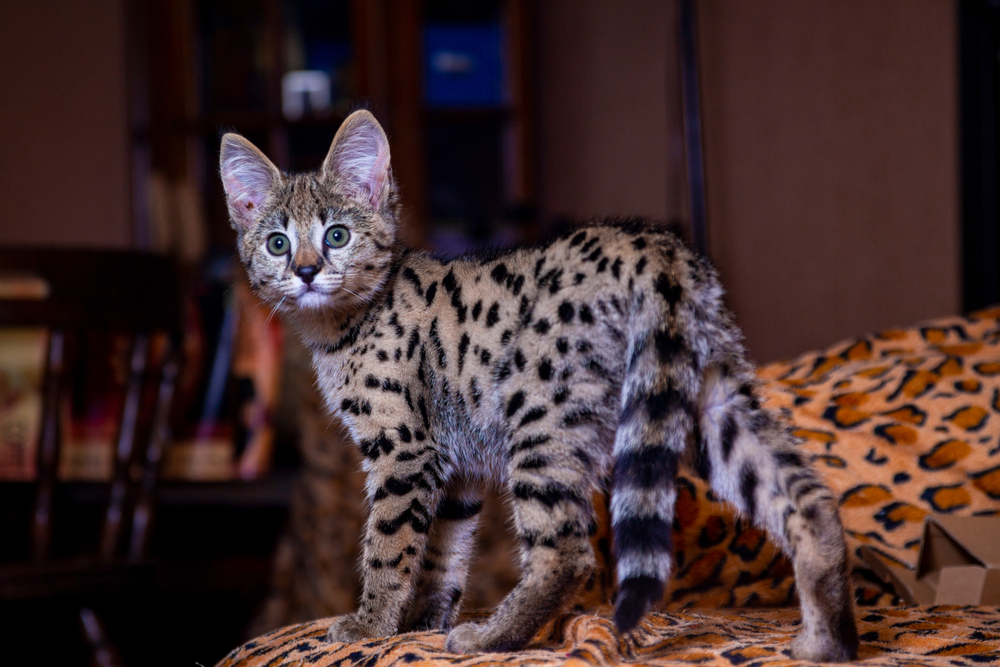
Any time you have a breed that’s only recently been domesticated, then early socialization is even more important. These cats can be loving and affectionate, but you’ll still need to teach them manners. If you don’t, you run the risk of creating behavioral problems down the line.
These cats are extremely playful all their lives, but it’s especially noticeable when they’re kittens. When they’re young, Savannahs only have three speeds: sleeping, playing, and eating.
Don’t be surprised if your hands, arms, and legs get covered with scratches while there’s a Savannah kitten around, as they can get rough until they learn to play politely. If they’re allowed to grow up among siblings, they should learn proper manners quite quickly
They often have small litters, though, with only 4 to 6 kittens on average. If you’re buying from a breeder, you may find that their siblings have been snatched up before they could spend much time getting acquainted.
A Quick Note About Savannah Generations
When shopping for a Savannah kitten, you may see different generational numbers mentioned, such as F1, F2, and the like. These refer to how many generations have passed since the original domestic cat/serval crossbreeding occurred.
For example, an F1 Savannah cat is 50% domestic cat and 50% serval. These cats are rare and difficult to produce, which is why they’re extremely expensive. These are the kittens that can cost upward of $16,000.
As you move down the generational line, you’ll have Savannahs bred with other Savannahs. This reduces the amount of serval inside the cat while also making them easier to breed and more likely to behave in a domesticated manner.
If you have your heart set on a cat from the F1–F3 generation, you’ll likely only get a male, as the females are often kept for breeding purposes. In later generations, the males are more likely to be kept for breeding, while the females are offered for sale.
There’s certainly more cachet in owning an early-generation Savannah, but don’t let that tempt you into making an impulsive purchase. The more wild cat DNA your Savannah has inside them, the harder they’ll be to raise, so be sure you’re up to the task ahead of time.

Temperament & Intelligence of the Savannah
As with so much else about these cats, their temperament will depend in large part on their lineage. The closer they are to being 50% serval, the less domesticated they’ll be. That means they won’t be as social and outgoing, and they’ll be more likely to run and hide when company comes over.
Since most Savannah cats are from later generations, though, you can likely expect your cat to be highly curious and affectionate. They’re often said to act more like dogs than cats, and that can include demanding attention and affection from their owners.
They’re extremely loyal, and they’ll often follow their owners everywhere they go. They can be extremely mischievous as well, and you’ll need to keep your belongings securely locked away if you don’t want your cat snooping.
That mischievousness is a clear indication of their fierce intelligence. You can often see the cats studying a problem and working out a solution in their heads. Of course, you won’t understand what they’re trying to do until you wake up in the morning to find an empty treat bag on the floor.
They’re so smart that many owners teach their cats to do tricks like play fetch. Savannahs can quickly master new skills, and they’re eager to learn, so long as there’s something in it for them.
Are These Cats Good for Families? 👪
The Savannah makes an excellent pet, especially for owners who don’t want a “traditional” cat. Their incredible loyalty makes them a faithful and loving companion, although they may choose a single person as their favorite at the expense of everyone else in the household.
They can be patient with small children, at least by a cat’s standards, and they have endless appetites for play. You can easily spend an entire afternoon catering to their whims, so it’s nice to be able to spread the burden out over several family members.
Savannahs can even do well with families that entertain often. Most Savannahs will come out to greet guests and demand affection from them. However, some prefer to hiss and hide, and it’s difficult to know which type your cat will be ahead of time.
Be aware, though, that as with any cat, there’s a limit to how much a Savannah will tolerate. Once they’ve had enough of being pestered, they can turn on small kids. Given that they’re much larger than most cats, it’s not surprising that they can do more damage when they want to.
Your entire family will likely grow quickly attached to your Savannah, and as long as you teach your children the proper way to behave around a cat, you should have little issue with the animal.
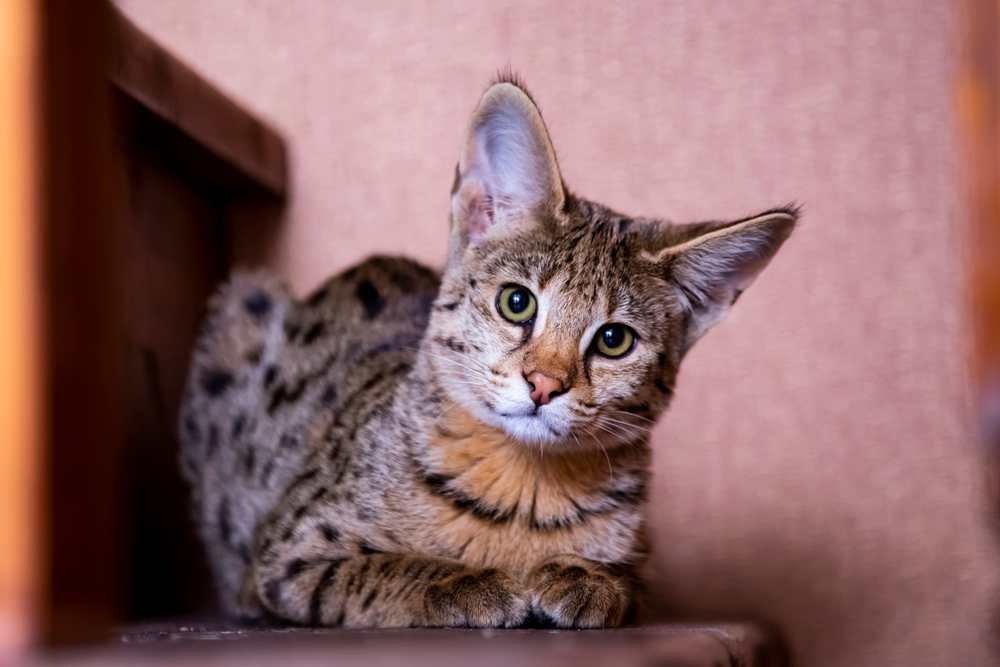
Does This Breed Get Along With Other Pets?
Whether your Savannah will get along with your dog will depend in large part on your dog. As long as your dog doesn’t antagonize the cat, they should get along famously.
That means you should take care to socialize the dog as much as possible, and it’s often best to bring a puppy into a house where the cat is already established rather than the other way around.
Also, keep in mind that these cats are bigger than some dogs, so if you have a toy breed with an attitude, they may find themselves on the receiving end of a beatdown. Don’t leave the two animals unattended until you’re relatively certain of how they’ll behave around one another.
Savannahs are incredible hunters, so it’s not a good idea to have pets like hamsters, birds, or fish around. You can’t really teach them to turn off their prey drive, so it’s better not to tempt them in the first place.
They often get along well with other cats, but again, remember the size advantage that your Savannah cat will have. If there are any fights, it’s unlikely that the other cat will enjoy the result.

Things to Know When Owning a Savannah
Owning a Savannah isn’t that much different from owning a regular cat, but they do have a few special needs that you should be aware of before you bring one home.
Below, we’ll walk you through a few things to keep in mind once you decide to adopt a Savannah. They may present a few challenges, but their companionship is well worth it.
Food & Diet Requirements 
Savannahs are considerably larger than average housecats, and as a result, they’ll eat more. However, that doesn’t mean you should let them eat as much as they want, as the breed can be prone to obesity, which is horrible for their health.
We recommend feeding them a mix of wet food and dry kibble. Wet food is an excellent source of moisture, which is important because these cats often spend more time playing in water than drinking it. They can get their protein and fiber from the kibble, as well as cleaner teeth from crunching it.
You may want to feed your Savannah a raw diet instead. Given their wild ancestry, these cats tolerate raw diets well. However, check with your vet beforehand to make sure that they’re getting all the vitamins and nutrients that they need.
Regardless of what you decide to feed them, their diet should be almost exclusively meat-based. Give them as much protein as you can, but avoid low-quality meats like animal by-products. Instead, look for foods that have a quality protein source as the primary ingredient.
Also, avoid filler carbs like wheat, corn, rice, and soy. Most cats don’t tolerate them well, and they can even lead to dehydration. Even if your cat has no issues digesting them, they’ll be a source of empty calories.
Exercise 🐈
If you don’t enjoy playing with your cat, the Savannah won’t be a good match for you.
These cats are extremely playful and active, so while they need tons of exercise every day, giving it to them shouldn’t be much of an issue. They’ll demand their playtime, and if you won’t provide it, they’ll spend hours racing around your home or climbing everything in sight.
Of course, some of the ways that they’ll decide to amuse themselves may not be appealing to you, so if you don’t want your furniture scratched to shreds, it’s in your best interests to tucker them out as much as you can.
Taking your cat for a walk or teaching them to play fetch is a great way to burn off excess energy, or you could spend the time dangling a toy for them. They’re not particular about how they get their exercise, just so long as they get it.
Having another cat or other similar-sized pet in the house can help with this as well. They love to roughhouse, so if there’s another animal present to wrestle with, it can help them relieve stress without putting any on you in the process.
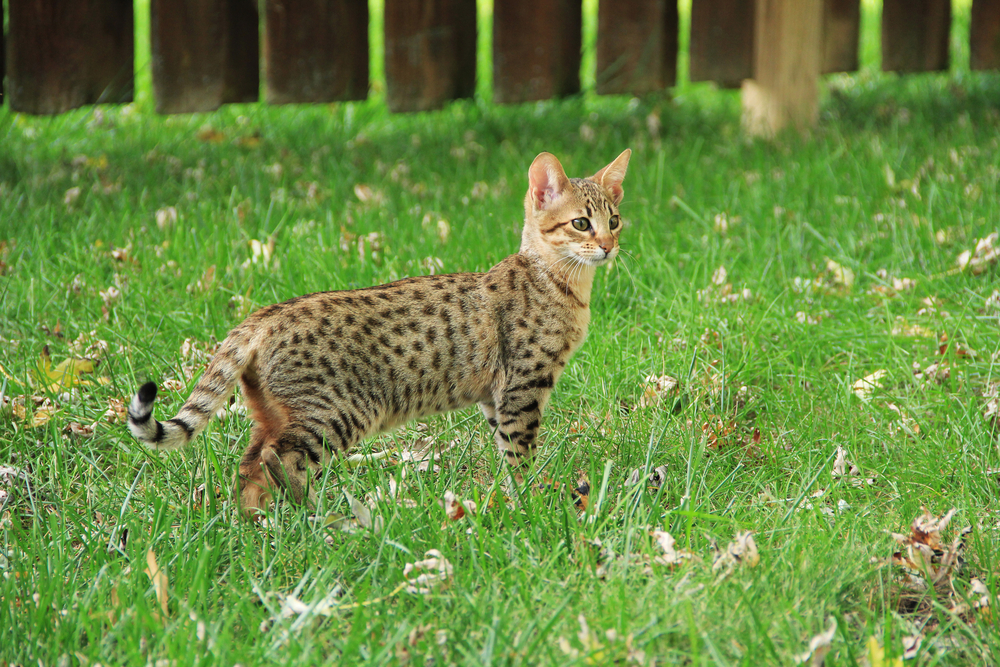
Training 🧶
If you want your Savannah to be well-behaved, then you need to take socialization as seriously as you can. It’s a process that should start the first day that you bring them home as kittens, and it should continue their entire lives.
When they’re exposed to new people, animals, and places, they learn to be calm and confident. That allows their natural gregariousness to bloom, and you won’t have a shy, skittish cat on your hands. Lack of socialization can also lead to aggression issues.
If you’re dealing with behavioral issues, the best way to handle them is to use positive reinforcement to redirect their attention in a productive manner. For example, if you have problems with furniture scratching, you should give them plenty of scratching posts to use instead and reward them when they do.
You can train them to do a variety of tricks and tasks like you would a dog. The process is basically the same, as you shape their behavior over time and reward them heavily with treats or affection when they succeed.
However, unlike with dogs, you likely won’t have much success teaching a cat to do anything that they’re not already interested in doing. If you get resistance, it may behoove you to find something else to teach them rather than engaging in a long-term battle of wills with your cat.
Grooming ✂️
Savannahs have short, dense coats, and they don’t shed nearly as much as many other breeds do. You shouldn’t need to do much in the way of brushing; just a few occasional swipes should keep the hair problem under control while keeping their coats shiny and lustrous.
You don’t necessarily need to bathe them, but you might not have a choice in the matter. Their love for water will ensure that they end up in the tub or sink sooner or later.
If they do get wet, make sure you dry them thoroughly, especially in the ears. You don’t want moisture pooling because that can lead to bacterial overgrowth and ear infections.
You’ll need to trim their nails and clean their teeth regularly, and if you introduce them to these processes early in life, it will make everything go much more smoothly when they’re full-grown. These cats can put up quite a fight if they feel like it, so you want to avoid any kerfuffles if you can.
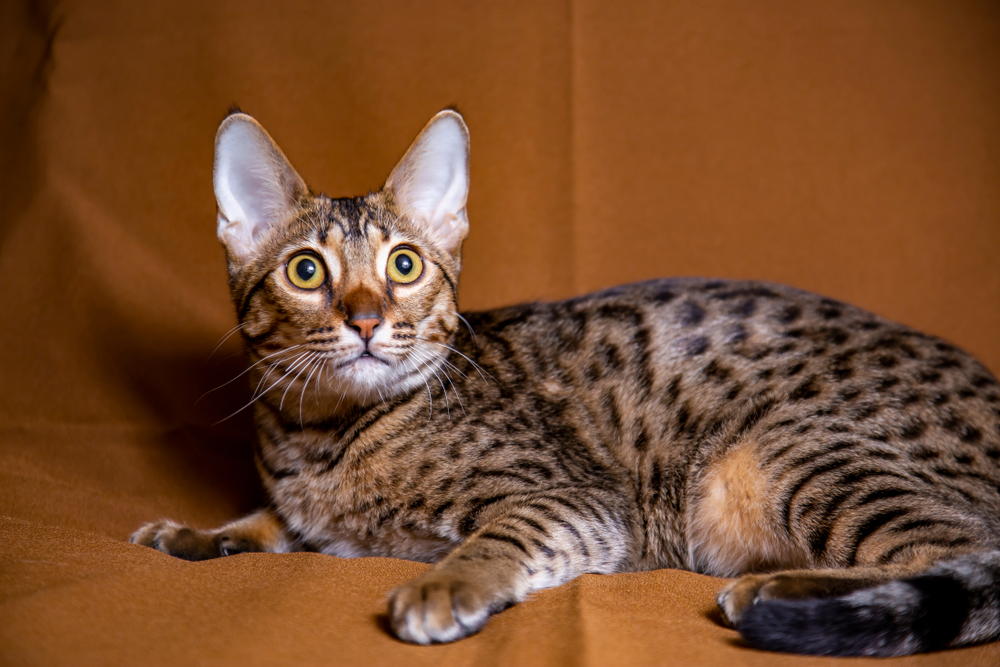
Health and Conditions 🏥
These cats tend to be fairly healthy, but they’re not without their concerns, which will vary depending on which generation you own, as servals have different health issues than purebred Savannahs do.
One such issue relates to their liver size. Servals have much smaller livers than most domestic housecats, and this is sometimes (but not always) passed on to Savannahs. This may not cause any medical issues, but it’s worth keeping an eye on your cat’s liver condition as they age.
Their hybrid nature can also cause issues when they have to go under anesthesia. There are certain anesthetics that they can’t tolerate, and it can be difficult to get the dosing correct due to their size.
Beyond that, there are a few other issues to be aware of.
- Hyperthyroidism
- Allergies
- Hypertrophic cardiomyopathy
- Arterial thromboembolism
- Feline lower urinary tract disease
- Renal failure
- Diabetes mellitus
Male vs Female
Male Savannahs are usually bigger than their female counterparts, so if you want the biggest cat that you can get, then bring a boy home.
Behaviorally, the two sexes are fairly similar. Males can be a bit needier, and you may find that your lap is permanently occupied if you have a boy in the house. Females are every bit as affectionate, but they may prefer to let you come to them.
If you want to have a multi-Savannah household but are worried about aggression issues, it’s best to pair a male and a female rather than two cats of the same sex. You can mitigate those concerns somewhat by getting your cats fixed, but the risk will always be higher with a unisex pairing.
Of course, all of this assumes that you’ll have some say over what sex of cat that you bring home. Keep in mind that if you want an early-generation Savannah, you’ll almost certainly have to get a male, but you may have to get a female if you want a later-generation cat.

3 Little-Known Facts About the Savannah
1. Unlike Most Housecats, Savannahs Love Water
If you’re thinking about disciplining your Savannah with a spray bottle, you might want to rethink your strategy. These cats adore splashing around in water, and they may climb into the bath with you if you’re not careful. Many owners even let their Savannahs shower with them!
In fact, many Savannah owners have trouble setting water bowls out for their cats, as the Savannahs often prefer slapping the water out of the container instead of drinking it.
2. They Need Vertical Space
Pretty much every cat loves to jump and climb, but Savannahs take that desire to the next level. They’re incredibly athletic, and they can leap incredible distances, so don’t be surprised if you find your cat in high-up places that you never dreamed they’d be able to reach.
If you bring a Savannah into your house, be sure to buy plenty of tall cat trees for them. You may even want to install shelves on your walls to give them places to leap and explore.
3. Many Savannah Cats Can Be Taught to Walk on a Leash
It’s important to remember that no matter what generation of Savannah you own, there’s still wild cat hiding in their genes. Wild cats love to explore in the open terrain, and your Savannah is unlikely to be an exception.
You can’t just slap a leash on your cat and take them for a stroll, though. You need to work up to it and don’t be surprised if your pet is skittish no matter how often you take them out.

Final Thoughts
Anyone who wants to experience what it’s like having a wild cat living in their house—but without the pesky threat of death—should consider bringing home a Savannah. These are big cats with personalities to match, and they’re experts at making people fall in love with them.
Any cat this wild and wonderful is bound to be expensive, though, and Savannahs are no exception. Expect to pay a pretty penny to bring one home, and be prepared to deal with bad behavior if you don’t socialize them properly.
If you put in the work, though, you’ll have a loving, loyal, and affectionate cat on your hands—and on top of your cabinets, in your shower, and curled up in your lap.
Related Reads
- Cat Statistics & Facts All Cat Lovers Should Know (Update)
- Savannah Cat Names: Great Ideas for Your Exotic Cat
- Do Savannah Cats Get Along With Dogs? Our Vet Answers & Provides Introduction Tips
Featured Image Credit: Dmytro Buianskyi, Shutterstock

